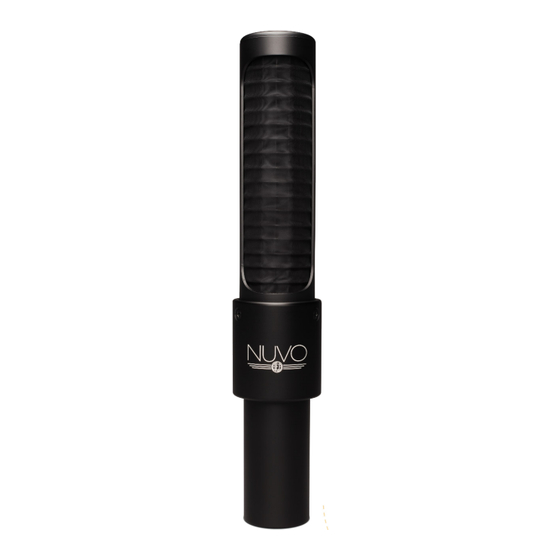Summary of Contents for AEA N8
- Page 1 ribbonmics & preamps since 1964 www.ribbonmics.com | tel: +1-626-798-9128 | fax: +1-626-798-2378 PHANTOM-POWERED RIBBON MICROPHONE OWNER’S MANUAL...
-
Page 2: Welcome
N8 delivers exceptional clarity and warmth, while also taking EQ extremely well. Additionally, the N8’s unobtrusive size and black finish is ideal for orchestral and TV work, where microphones need to be easy to position and more or less invisible. -
Page 3: Table Of Contents
TABLE OF CONTENTS WELCOME INTRODUCTION GENERAL GUIDELINES APPLICATION ADVICE Controlling Leakage Proximity Effect Drums and Percussion Strings, Brass, and Reeds Piano Electric Guitar and Bass PRECAUTIONS Phantom-power Wind Gusts Tramp Iron Microphone Positioning Magnetic Stray Fields SPECIFICATIONS WARRANTY SUPPORT... -
Page 4: Introduction
Wes Dooley’s take on the evolution of the ribbon microphone. GENERAL GUIDELINES The two sides of the N8 (front and back) are voiced exactly the same. Keep in mind, however, that the backside has opposite polarity compared to the front. Positive polarity is achieved by positioning the side with the “NUVO”... -
Page 5: Application Advice
Such a setup requires complex and often cumbersome headphone monitor mixes for the musicians. Because the N8 has a bidirectional pattern, it has nulls at 90° / 270° from the principal (front) axis. Projected in three dimensions, these nulls produce a “plane of rejection” to the sides of the microphone that can... -
Page 6: Proximity Effect
You will generally find that well-designed ribbon microphones like the N8 capture a natural off-axis sound, which means that bleed from other instruments can contribute to the overall sound in a pleasing way. -
Page 7: Drums And Percussion
As a result we suggest the following guidelines to help you to achieve optimum results when using the N8. In addition, make sure to watch the videos on our website (www. ribbonmics.com) and on our YouTube channel (www.youtube.com/AEAribbonmics) for more tips. -
Page 8: Strings, Brass, And Reeds
N8 there and move to taste. For solo instruments, try placing the N8 a few feet away. This will give a very up-close and personal sound. Set the microphone above or in front of the instrument. -
Page 9: Electric Guitar And Bass
Watch out for wind blasts, percussive players, and very loud bass cabinets that push air. The N8 has the least amount of protection in it for a more open sound which means you should be extra careful to avoid sudden blasts of wind. -
Page 10: Phantom-Power
Phantom Power Although the N8 needs a standard 48V phantom-power source to operate, you should still make sure that phantom power is turned off before plugging and unplugging the microphones. The loud pops that occur when the microphone is plugged in with phantom-power engaged can damage speakers, headphones, and ears. -
Page 11: Microphone Positioning
Guitar players will know this phenomenon from single-coil pickups. Even though much attention was paid to suppressing these magnetic fields in the design of the N8, it is still possible that you might encounter this problem. If you should pick up a hum, try rotating or moving the microphone to find a spot where the hum disappears and try eliminating potential sources of stray magnetic fields. -
Page 12: Specifications
SPECIFICATIONS Pressure gradient transducer Operating Principle: Bidirectional Directional Pattern: < 20 Hz to 20 kHz Frequency Range: Maximum SPL: 141 dB SPL (1% third harmonic > 1 kHz) Sensitivity: 8.3 mV/Pa (at 1 kHz, no load) Rated Impedance: 92 Ω broadband Rated Load Impedance: 1.0 kΩ... -
Page 13: Accessories Included
Accessories Included: Storage/shipping case, microphone stand clip, custom protective mic sleeve, user manual... -
Page 14: Warranty
WARRANTY Your N8 microphone comes with a one-year limited warranty on parts and labor, shipping not included. Please see the supplied warranty card for details. Registering your microphone with AEA will extend the warranty to a full three years. Simply fill out the supplied registration form and send it to: Audio Engineering Associates 1029 N.
















Need help?
Do you have a question about the N8 and is the answer not in the manual?
Questions and answers